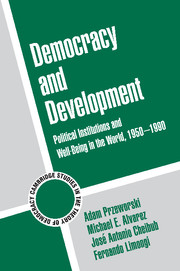Book contents
- Frontmatter
- Contents
- List of Tables and Figures
- Acknowledgments
- Introduction
- 1 Democracies and Dictatorships
- 2 Economic Development and Political Regimes
- 3 Political Regimes and Economic Growth
- 4 Political Instability and Economic Growth
- 5 Political Regimes and Population
- Conclusion
- Appendix I Selection Model
- Appendix II Codebook
- References
- Author Index
- Country Index
- Subject Index
1 - Democracies and Dictatorships
Published online by Cambridge University Press: 05 June 2012
- Frontmatter
- Contents
- List of Tables and Figures
- Acknowledgments
- Introduction
- 1 Democracies and Dictatorships
- 2 Economic Development and Political Regimes
- 3 Political Regimes and Economic Growth
- 4 Political Instability and Economic Growth
- 5 Political Regimes and Population
- Conclusion
- Appendix I Selection Model
- Appendix II Codebook
- References
- Author Index
- Country Index
- Subject Index
Summary
Introduction
To study systematically the origins and the consequences of political regimes, we need first to determine what regime each country has had during each period of its history. This is a complicated and irredeemably controversial undertaking. Although “democracy” and “dictatorship” are concepts of everyday usage, the intuitions we associate with them are not always sufficient to determine that a particular country operated according to one or the other at a given time. Thus we must formalize these concepts in terms of rules that can be decisively and reliably applied to the observable aspects of national histories. And once we have such rules, we must apply them. Any such procedure necessitates going back and forth between conceptual analysis and historical observation. Closure is difficult to reach: In some cases, history simply has not generated the information called for by the rules, and we must accept the fact that there will be systematic errors. Other cases are so idiosyncratic that we must accept the fact that they have to be treated as random errors. Nevertheless, although no classification can be free of errors, the encouraging lesson is that independent endeavors by different researchers have led to very similar results.
Although several classifications of regimes, covering different periods and sets of countries, are now available, they can, in our view, be improved by (1) a better grounding in political theory, (2) exclusive reliance on observables, rather than on subjective judgments, (3) an explicit distinction between systematic and random errors, and (4) more extensive coverage.
- Type
- Chapter
- Information
- Democracy and DevelopmentPolitical Institutions and Well-Being in the World, 1950–1990, pp. 13 - 77Publisher: Cambridge University PressPrint publication year: 2000
- 5
- Cited by



